The quartet’s new album American Voices showcases the diversity of America’s rich musical folk traditions with works by Dvořák, Price, Louis Gruenberg, plus a new commission by James Lee III
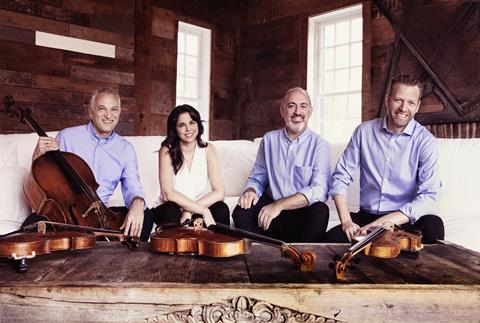
Discover more Featured Stories like this in The Strad Playing Hub
Your new album American Voices takes listeners on a journey showcasing America’s sonic heritage. Tell us about why you wanted to illustrate this theme for the album
With the release of our album American Voices, we are thrilled to join the national conversation surrounding the commemoration of the upcoming 250th anniversary of America in 2026. The second installment in our three-disc recording retrospective, this album has been a labour of love and invites listeners to embark with us on a journey that explores a sampling of works directly connected to a diversity of facets relating to our nation’s history.
American Voices gave us a unique opportunity to present a collage of works capturing the diversity of America’s rich musical folk traditions, while paying homage to some of the artistic voices that made these distinctive sonorities synonymous with the American musical landscape. Featuring Dvořák’s beloved ’American’ String Quartet and his well-documented use of American folk elements as the centerpiece for the album, we paired this masterpiece with two less-familiar works by Florence Price and Louis Gruenberg who, like Dvořák, artfully integrate their own reimaginings of these folk elements into stunning works for string quartet.
Given the significance of this important national anniversary, we were also delighted to commission a new humanitarian composition from our good friend James Lee III. This work for quartet and youth choir not only invites chamber music lovers to experience evocative music that brings awareness to the needs of the less fortunate, but it is also a dynamic catalyst that directly engages the next generation of audiences to lend their voices in support while practically addressing the needs of others.
Dvořák’s ’American’ String Quartet is such a staple in string quartet repertoire. How does your ensemble make sure to keep things fresh when approaching this work?
Over the 30 years we have been a quartet, the Dvořák ’American’ Quartet is a piece we continually come back to. It is one of the quartets that defines our journey as a string quartet. We learnt it when we were just forming and have programmed it many times throughout our career. There’s something magical about the way Dvořák writes for the string quartet. He understands the unique chemistry between the four instruments. He uses texture brilliantly to give each member an exciting and satisfying part to play on their own, yet when combined these individual voices come to life as essential parts of a whole, very much greater than the sum of its parts. The warmth and sincerity in the writing makes us feel every time we play it like we’re coming home.
As with all great pieces of music that we are lucky enough to get to live with over decades, we are constantly exploring ways to deepen our interpretations. Our rehearsals in pieces that feel like ’coming home’ can be the most intense of all. We spend most of our rehearsal discussing our interpretations of even the most minute details, sharing thoughts and ideas about every phrase. We try different phrasing, dynamics, tempos, and articulations, and encourage each other to look at melodies from all sides and explore all possibilities. We address in every rehearsal the technical challenges and discuss how best to surmount them. All of this discussion, experimentation, and technical work collectively shapes our next performance. Additionally, every time we perform the piece our interpretation slightly changes. As performers we feel what works for an audience and what doesn’t, and our ever-evolving interpretation is a result of the symbiotic relationship between our ideas about the piece and our audience’s reaction to them.
Tell us about Florence Price’s String Quartet in G major. As with so much of her work being discovered in recent years, can you tell us how you encountered the piece, and what made you want to perform and record it?
We were delighted to discover Florence Price’s String Quartet in G major, a jewel in the string quartet repertoire that has been a joy to perform and record. After a large trove of her music was found in an abandoned house in Illinois some 15 years ago, musicians rapidly became aware of this prolific composer’s neglected and unpublished works and curiosity got the best of us! It is a great pleasure to celebrate this colourful and beautiful quartet in concert and on disc, because this music comes straight from the heart and speaks to us in a direct, honest, and soulful voice that audiences have grown to love. Practically speaking, it’s a wonderful way to open a concert, and the slow movement has proven to be a delectable encore.
How would you describe Louis Gruenberg’s Four Diversions?
Diversion can refer to an amusement or bring to mind the straying from one’s original course. Gruenberg’s Four Diversions for String Quartet do both. The music wanders quickly from one delight to the next leaving indelible impressions on the listener.
All four have a distinctly American feel that could easily be soundtracks to a classic cartoon. Chase scenes, slapstick violence, dizzy spells and other capricious surprises are all depicted through swift changes in dynamics, flighty scales, and conversational interactions.
In the third diversion, Gruenberg distorts a cliche horseback rhythm to paint the picture of a drunken cowboy wandering through an old western town. The fourth diversion (Allegro burlando) characterises a mischievous prankster as the instruments snicker and giggle throughout.
Gruenberg seamlessly blends traditions of western classical music with 20th century Americana as though he were directly following Dvořák’s lead. He blends the improvisatory elements of jazz and classical techniques to create an undeniable Hollywood feel. It is no surprise that he went on to a successful career as a film composer.
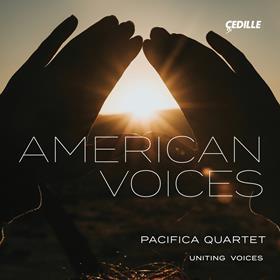
Finally, on James Lee III’s new commission Pitch In. How was it recording with a children’s choir? How do you think this lent itself to the work?
Considering the legacy left for future generations as part of our 250th anniversary recording initiative, we were thrilled to work with James Lee III to create this unique humanitarian commission. Titled Pitch In, this project gave us an exciting opportunity to share with our listeners a beautiful fusion of music and poetry (by Sylvia Dianne Beverly) that not only captures a harmonious collaboration between artists of different ages and backgrounds, but also challenges listeners and performers alike to consider what we can each do to help address food insecurity while supporting those in need.
It was a treat for us to record this new work for string quartet and children’s choir with the talented Chicago-based ensemble ’Uniting Voices’, and working in conjunction with our record label Cedille, a percentage of the proceeds from each album sold will be donated to charities dedicated to fighting poverty and homelessness.
American Voices by the Pacifica Quartet is out now on Cedille Records.
Watch: PUBLIQuartet performs ‘What is American’
Read: ‘American Stories’ Chronicled: A Contemporary Recording for a Contemporary Time
Discover more Featured Stories like this in The Strad Playing Hub
The number one source for playing and teaching books, guides, CDs, calendars and back issues of the magazine.
In The Best of Technique you’ll discover the top playing tips of the world’s leading string players and teachers. It’s packed full of exercises for students, plus examples from the standard repertoire to show you how to integrate the technique into your playing.
The Strad’s Masterclass series brings together the finest string players with some of the greatest string works ever written. Always one of our most popular sections, Masterclass has been an invaluable aid to aspiring soloists, chamber musicians and string teachers since the 1990s.
American collector David L. Fulton amassed one of the 20th century’s finest collections of stringed instruments. This year’s calendar pays tribute to some of these priceless treasures, including Yehudi Menuhin’s celebrated ‘Lord Wilton’ Guarneri, the Carlo Bergonzi once played by Fritz Kreisler, and four instruments by Antonio Stradivari.

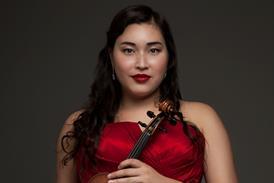

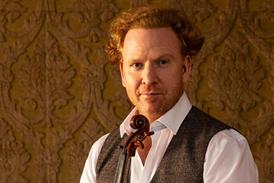




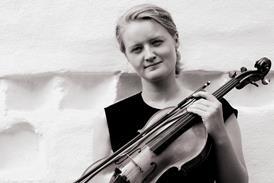




























No comments yet